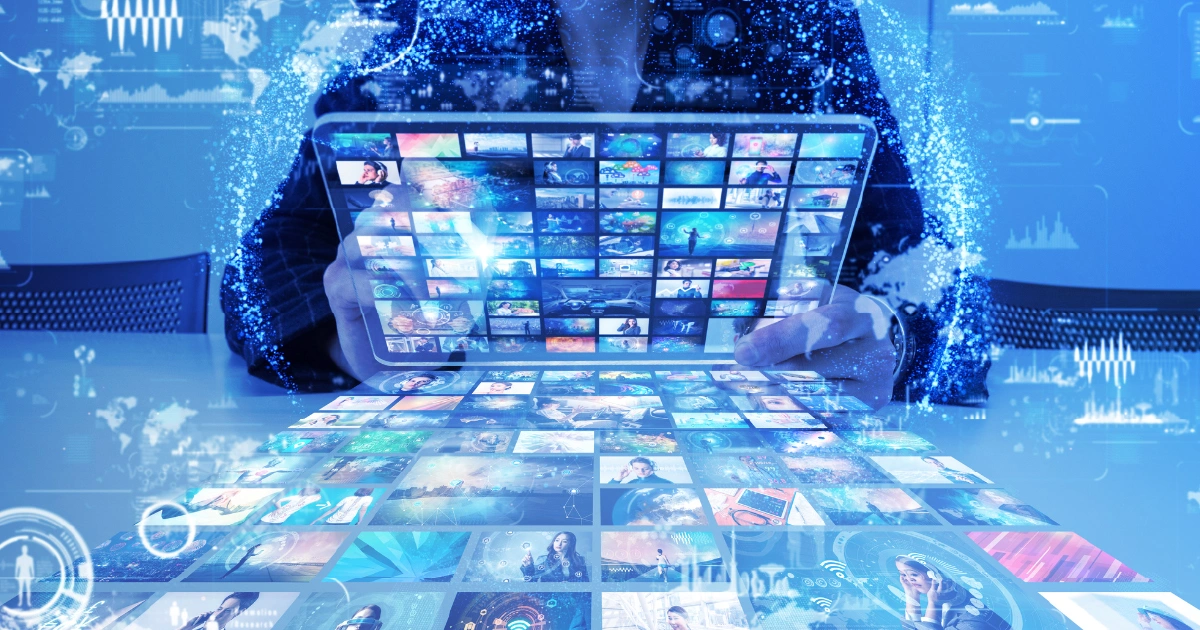
A Double-Edged Sword
Cut through the pros and cons of AI’s impact on media rights and revenue
In my previous blog post, I stated that artificial intelligence (AI) was the most significant topic discussed at the 2024 NAB Show, and I referred to AI as a double-edged sword. While AI offers copyright protection benefits, generative AI raises concerns about content ownership and potential piracy. I want to elaborate on this thought and further explore AI’s impact on the media and entertainment industry.
I believe AI can play a pivotal role in safeguarding intellectual property (IP). Its ability to analyze vast datasets and detect copyright infringement is unparalleled. Content recognition algorithms scan audio, video and images, identifying unauthorized use and protecting creators’ rights. As a media industry professional, you must embrace AI as your ally in the battle against piracy and unauthorized distribution.
The yin and yang of AI
The positive impacts of AI include:
- Consumer behavior insights help you optimize pricing strategies, forecast demand and tailor marketing efforts.
- Personalized user experiences increase engagement and retention.
- Audience preference insights help you optimize content creation and distribution.
- Market trend and audience demographic insights across different regions help rights holders optimize licensing deals and maximize revenue from territorial rights.
- Historical data helps predict which content bundles resonate most with specific audience segments, allowing rights holders to create targeted offerings that generate higher revenue.
The negative impacts of AI include:
- Unclear ownership can lead to disputes and hinder monetization efforts.
- High-quality pirated content is difficult to distinguish from the original and can further erode revenue streams.
- Biases from training data could potentially affect content recommendations and copyright enforcement.
- Hyper-realistic deepfakes blur the line between authentic and manipulated content.
- Lack of clarity as to who owns the derivative work and whether content taken from artist libraries is licensed.
- The ownership of the derivative work and the licensing status of content sourced from artist libraries can be unclear.
- Unpredictability of content generated by AI when derived from other AI-created content.
- Difficulty recognizing AI-generated content sources vs. original work.
- Costly AI tools can produce output that falls short of human creativity.
Data: The media compass in the Age of AI
I believe data should be used as the compass guiding the media industry in the Age of AI. It enhances content creation and management, personalizes audience experiences and develops monetization strategies in the following 7 ways:
- Predicting audience preferences and enabling creators to tailor content. Whether it’s a TV series, a podcast or a digital article, understanding what resonates with viewers ensures higher engagement and retention.
- Identifying high-risk content like newly released blockbusters and customizing protection measures accordingly.
- Analyzing historical licensing data and audience preferences to help rights holders develop flexible licensing agreements that account for AI-generated content.
- Making informed decisions about release windows for content across different platforms to ensure rights are exploited at the most opportune times.
- Automating rights tracking and ensuring accurate royalty calculations.
- Analyzing user behavior and consumption patterns to inform pricing strategies and maximize revenue.
- Guiding your licensing decisions so you can better understand which markets will respond well to specific genres and where shows should be syndicated.
AI is part of the journey, not the destination
AI is a formidable tool that can transform the way we manage media content. However, I believe it’s crucial to acknowledge and address the challenges posed by generative AI. The future of media is data-driven, and AI presents a unique opportunity to unlock its full potential.
In my opinion, the question isn’t whether to embrace AI, but how to wield AI’s double-edged sword wisely and responsibly.
For more details on how AI-driven technologies are changing how we select and view media content, check out our blog.
Get the latest news, updates, and exclusive insights from Vistex delivered straight to your inbox. Don’t miss out—opt in now and be the first to know!

